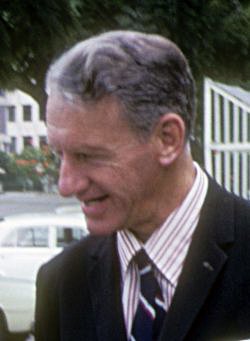|
Tichafa Samuel Parirenyatwa
Tichafa Samuel Parirenyatwa (17 July 1927 – 14 August 1962) was Zimbabwe's first trained black physician, medical doctor and the first vice-president of the Zimbabwe African People's Union (ZAPU). He rose to prominence during ZAPU's political struggle against the colonial administration in Southern Rhodesia. Early life Parirenyatwa was born at Rusape in Manicaland and grew up in Sakubva township, Mutare. Along with many future Zimbabwean nationalists, he matriculated at South Africa's University of Fort Hare in the Eastern Cape, subsequently obtaining his degree from the University of Witwatersrand. He later underwent further medical training in Durban. Upon returning to Southern Rhodesia, Parirenyatwa was instrumental in forming the Mashonaland Herbalists' Association – the first organisation of n'angas in Sub-Saharan Africa at the time. This group recognised traditional healers as public servants and set a general code of conduct for dealings with the Rhodesian public. ... [...More Info...] [...Related Items...] OR: [Wikipedia] [Google] [Baidu] |
ZAPU
The Zimbabwe African People's Union (ZAPU) is a Zimbabwean political party. It is a militant communist organization and political party that campaigned for majority rule in Rhodesia, from its founding in 1961 until 1980. In 1987, it merged with the Zimbabwe African National Union-Patriotic Front (ZANU – PF). The party was formed on 17 December 1961, 10 days after the Rhodesian government banned the National Democratic Party (NDP). It was founded by Joshua Nkomo as president, Samuel Parirenyatwa as vice-president, Ndabaningi Sithole as chairman, Jason Moyo as treasurer, Robert Mugabe as information and publicity secretary, and Leopold Takawira as external secretary. ZAPU was banned in 1962 by the Rhodesian white minority government, and later engaged in a guerrilla war against it. The armed wing of ZAPU, known as the Zimbabwe People's Revolutionary Army (ZIPRA), was founded by Moyo and commanded by General Lookout Masuku. ZAPU was separate from ZANU as its armed wing, ZI ... [...More Info...] [...Related Items...] OR: [Wikipedia] [Google] [Baidu] |
Sub-Saharan Africa
Sub-Saharan Africa is the area and regions of the continent of Africa that lie south of the Sahara. These include Central Africa, East Africa, Southern Africa, and West Africa. Geopolitically, in addition to the list of sovereign states and dependent territories in Africa, African countries and territories that are situated fully in that specified region, the term may also include polities that only have part of their territory located in that region, per the definition of the United Nations geoscheme for Africa, United Nations (UN). This is considered a non-standardised geographical region with the number of countries included varying from 46 to 48 depending on the organisation describing the region (e.g. United Nations, UN, World Health Organization, WHO, World Bank, etc.). The Regions of the African Union, African Union (AU) uses a different regional breakdown, recognising all 55 member states on the continent—grouping them into five distinct and standard regions. The te ... [...More Info...] [...Related Items...] OR: [Wikipedia] [Google] [Baidu] |
Traffic Collision
A traffic collision, also known as a motor vehicle collision, or car crash, occurs when a vehicle collides with another vehicle, pedestrian, animal, road debris, or other moving or stationary obstruction, such as a tree, pole or building. Traffic collisions often result in injury, disability, death, and property damage as well as financial costs to both society and the individuals involved. Road transport is statistically the most dangerous situation people deal with on a daily basis, but casualty figures from such incidents attract less media attention than other, less frequent types of tragedy. The commonly used term car accident is increasingly falling out of favor with many government departments and organizations: the Associated Press style guide recommends caution before using the term and the National Union of Journalists advises against it in their Road Collision Reporting Guidelines. Some collisions are intentional vehicle-ramming attacks, staged crashes, vehicu ... [...More Info...] [...Related Items...] OR: [Wikipedia] [Google] [Baidu] |
Matabeleland
Matabeleland is a region located in southwestern Zimbabwe that is divided into three provinces: Matabeleland North, Bulawayo, and Matabeleland South. These provinces are in the west and south-west of Zimbabwe, between the Limpopo and Zambezi rivers and are further separated from Midlands by the Shangani River in central Zimbabwe. The region is named after its inhabitants, the Ndebele people who were called "Amatabele"(people with long shields – Mzilikazi 's group of people who were escaping the Mfecani wars). Other ethnic groups who inhabit parts of Matabeleland include the Tonga, Bakalanga, Venda, Nambya, Khoisan, Xhosa, Sotho, Tswana, and Tsonga. The capital and largest city is Bulawayo, other notable towns are Plumtree, Victoria Falls, Beitbridge, Lupane, Esigodini, Hwange Gwanda and Maphisa. The land is fertile but semi arid. This area has coal and gold deposits. Industries include gold and other mineral mines, and engineering. There has been a decli ... [...More Info...] [...Related Items...] OR: [Wikipedia] [Google] [Baidu] |
Harare
Harare ( ), formerly Salisbury, is the Capital city, capital and largest city of Zimbabwe. The city proper has an area of , a population of 1,849,600 as of the 2022 Zimbabwe census, 2022 census and an estimated 2,487,209 people in its metropolitan province. The city is situated in north-eastern Zimbabwe in the country's Mashonaland region. Harare Metropolitan Province incorporates the city and the municipalities of Chitungwiza, Epworth, Zimbabwe, Epworth and Ruwa. The city sits on a plateau at an elevation of above sea level, and its climate falls into the subtropical highland category. The city was founded in 1890 by the Pioneer Column, a small military force of the British South Africa Company, and was named Southern Rhodesia, Fort Salisbury after the British Prime Minister Robert Gascoyne-Cecil, 3rd Marquess of Salisbury, Lord Salisbury. Company Company rule in Rhodesia, administrators Demarcation line, demarcated the city and ran it until Southern Rhodesia achieved respo ... [...More Info...] [...Related Items...] OR: [Wikipedia] [Google] [Baidu] |
Edgar Whitehead
Sir Edgar Cuthbert Fremantle Whitehead, (8 February 1905 – 22 September 1971) was a Rhodesian politician and statesman who served as Prime Minister of Southern Rhodesia from 1958 to 1962. He had a long and varied political career, serving as a longstanding member of the Southern Rhodesian Legislative Assembly and in a variety of minister posts over the course of nearly three decades. simultaneously serving in a variety of government position posts. His work was frequently interrupted by recurring health problems; he suffered from poor eyesight and later experienced deafness whilst in office. An ally of Sir Roy Welensky, he was Prime Minister of Southern Rhodesia from 1958 to 1962. His government was defeated in the 1962 general election by the Rhodesian Front. Early life Whitehead was born in the British Embassy in Berlin, where his father Sir James Beethom Whitehead was a diplomat. He was educated at Shrewsbury School and University College, Oxford, and moved to ... [...More Info...] [...Related Items...] OR: [Wikipedia] [Google] [Baidu] |
British South Africa Police
The British South Africa Police (BSAP) was, for most of its existence, the police force of Southern Rhodesia and Rhodesia (renamed Zimbabwe in 1980). It was formed as a paramilitary force of mounted infantrymen in 1889 by Cecil Rhodes' British South Africa Company, from which it took its original name, the British South Africa Company's Police. Initially run directly by the company, it began to operate independently in 1896, at which time it also dropped "Company's" from its name. It thereafter served as Rhodesia's regular police force, retaining its name, until 1980, when it was superseded by the Zimbabwe Republic Police, soon after the country's reconstitution into Zimbabwe in April that year. While it was in the main a law enforcement organisation, the line between police and military was significantly blurred. BSAP officers trained both as policemen and regular soldiers until 1954. BSAP men served in the latter role during the First and Second World Wars, and also provi ... [...More Info...] [...Related Items...] OR: [Wikipedia] [Google] [Baidu] |
International Confederation Of Free Trade Unions
The International Confederation of Free Trade Unions (ICFTU) was an international trade union. It came into being on 7 December 1949 following a split within the World Federation of Trade Unions (WFTU), and was dissolved on 31 October 2006 when it merged with the World Confederation of Labour (WCL) to form the International Trade Union Confederation (ITUC). Prior to being dissolved, the ICFTU had a membership of 157 million members in 225 affiliated organisations in 148 countries and territories. History In 1949, early in the Cold War, alleging Communism, Communist domination of the WFTU's central institutions, a large number of non-communist national trade union federations (including the U.S. Congress of Industrial Organizations (CIO), the British Trades Union Congress, TUC, the French Force Ouvrière, FO, the Italian Italian Confederation of Workers' Trade Unions, CISL and the Spanish Unión General de Trabajadores, UGT) seceded and created the rival ICFTU at a conference ... [...More Info...] [...Related Items...] OR: [Wikipedia] [Google] [Baidu] |
World Federation Of Trade Unions
The World Federation of Trade Unions (WFTU) is an international federation of trade union, trade unions established on October 3, 1945. Founded in the immediate aftermath of World War Two, the organization built on the pre-war legacy of the International Federation of Trade Unions as a single structure for trade unions world-wide, following the World Trade Union Conference#Committee, World Trade Union Conference in London, United Kingdom. With the emergence of the Cold War in the late 1940s, the WFTU splintered, with most trade unions from the Western bloc, Western-aligned countries leaving and creating the International Confederation of Free Trade Unions (ICFTU) in 1949. Throughout the Cold War, membership of the WFTU was made up predominantly of trade unions from the Eastern Bloc, Soviet-aligned and Non-Aligned Movement, non-aligned countries. However, there were notable exceptions to this, such as the Yugoslav and Chinese unions, which departed following the Tito–Stalin s ... [...More Info...] [...Related Items...] OR: [Wikipedia] [Google] [Baidu] |
Ndabaningi Sithole
Ndabaningi Sithole (21 July 1920 – 12 December 2000) was a Zimbabwean politician and statesman who was the founder of the Zimbabwe African National Union (ZANU), a militant, nationalist organisation that opposed the government of Rhodesia, in July 1963.Veenhoven, Willem Adriaan, Ewing, and Winifred Crum. ''Case Studies on Human Rights and Fundamental Freedoms: A World Survey'', 1975. Page 326. He worked as a United Church of Christ in Zimbabwe (UCCZ) minister. He spent 10 years in prison after the government banned ZANU. A rift along tribal lines split ZANU in 1975, and he lost the 1980 elections to Robert Mugabe. Early life Sithole was born in Nyamandlovu, Southern Rhodesia, on 21 July 1920. Sithole's father was Ndau and his mother was Ndebele. He studied teaching in the United States from 1955 to 1958, and was ordained a Methodist minister in 1958. The publication of his book ''African Nationalism'' and its immediate prohibition by the minority government motivated his ... [...More Info...] [...Related Items...] OR: [Wikipedia] [Google] [Baidu] |
Robert Mugabe
Robert Gabriel Mugabe (; ; 21 February 1924 – 6 September 2019) was a Zimbabwean revolutionary and politician who served as Prime Minister of Zimbabwe from 1980 to 1987 and then as President from 1987 to 2017. He served as Leader of the Zimbabwe African National Union (ZANU) from 1975 to 1980 and led its successor political party, the ZANU – Patriotic Front (ZANU–PF), from 1980 to 2017. Ideologically an African nationalist, during the 1970s and 1980s he identified as a Marxist–Leninist, and as a socialist during the 1990s and the remainder of his career. Mugabe was born to a poor Shona family in Kutama, Southern Rhodesia. Educated at Kutama College and the University of Fort Hare in South Africa, he then worked as a schoolteacher in Southern Rhodesia, Northern Rhodesia, and Ghana. Angered by white minority rule of his homeland within the British Empire, Mugabe embraced Marxism and joined African nationalists calling for an independent state controlled by t ... [...More Info...] [...Related Items...] OR: [Wikipedia] [Google] [Baidu] |





